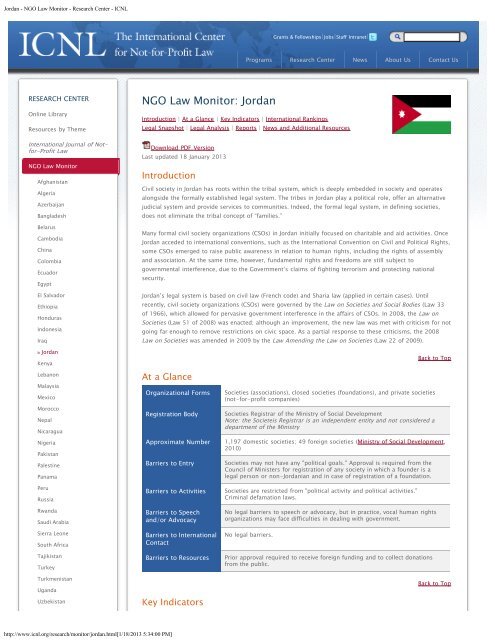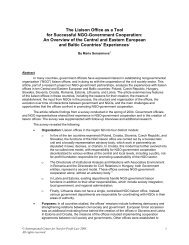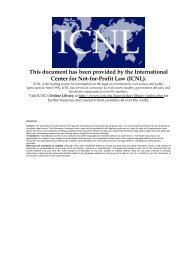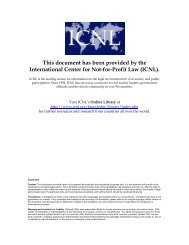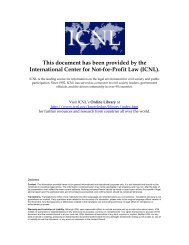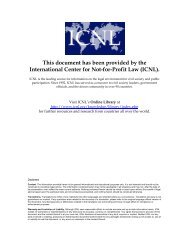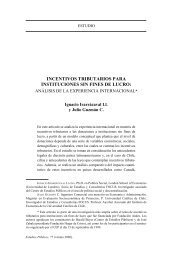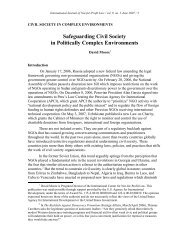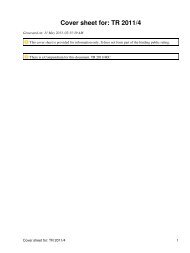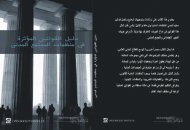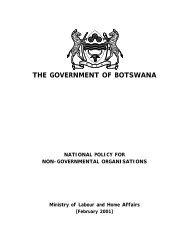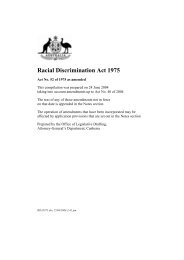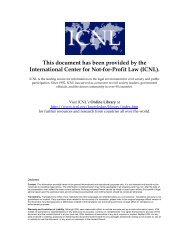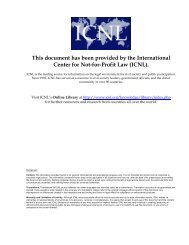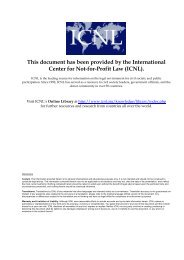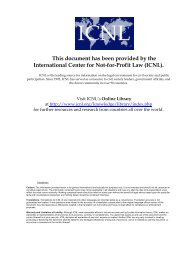Jordan - NGO Law Monitor - Research Center - ICNL - The ...
Jordan - NGO Law Monitor - Research Center - ICNL - The ...
Jordan - NGO Law Monitor - Research Center - ICNL - The ...
Create successful ePaper yourself
Turn your PDF publications into a flip-book with our unique Google optimized e-Paper software.
<strong>Jordan</strong> - <strong>NGO</strong> <strong>Law</strong> <strong>Monitor</strong> - <strong>Research</strong> <strong>Center</strong> - <strong>ICNL</strong><br />
Grants & Fellowships|Jobs|Staff Intranet|<br />
Programs <strong>Research</strong> <strong>Center</strong> News About Us Contact Us<br />
RESEARCH CENTER<br />
Online Library<br />
Resources by <strong>The</strong>me<br />
International Journal of Notfor-Profit<br />
<strong>Law</strong><br />
<strong>NGO</strong> <strong>Law</strong> <strong>Monitor</strong><br />
Afghanistan<br />
Algeria<br />
Azerbaijan<br />
Bangladesh<br />
Belarus<br />
Cambodia<br />
China<br />
Colombia<br />
Ecuador<br />
Egypt<br />
El Salvador<br />
Ethiopia<br />
Honduras<br />
Indonesia<br />
Iraq<br />
<strong>NGO</strong> <strong>Law</strong> <strong>Monitor</strong>: <strong>Jordan</strong><br />
Introduction | At a Glance | Key Indicators | International Rankings<br />
Legal Snapshot | Legal Analysis | Reports | News and Additional Resources<br />
Download PDF Version<br />
Last updated 18 January 2013<br />
Introduction<br />
Civil society in <strong>Jordan</strong> has roots within the tribal system, which is deeply embedded in society and operates<br />
alongside the formally established legal system. <strong>The</strong> tribes in <strong>Jordan</strong> play a political role, offer an alternative<br />
judicial system and provide services to communities. Indeed, the formal legal system, in defining societies,<br />
does not eliminate the tribal concept of “families.”<br />
Many formal civil society organizations (CSOs) in <strong>Jordan</strong> initially focused on charitable and aid activities. Once<br />
<strong>Jordan</strong> acceded to international conventions, such as the International Convention on Civil and Political Rights,<br />
some CSOs emerged to raise public awareness in relation to human rights, including the rights of assembly<br />
and association. At the same time, however, fundamental rights and freedoms are still subject to<br />
governmental interference, due to the Government’s claims of fighting terrorism and protecting national<br />
security.<br />
<strong>Jordan</strong>’s legal system is based on civil law (French code) and Sharia law (applied in certain cases). Until<br />
recently, civil society organizations (CSOs) were governed by the <strong>Law</strong> on Societies and Social Bodies (<strong>Law</strong> 33<br />
of 1966), which allowed for pervasive government interference in the affairs of CSOs. In 2008, the <strong>Law</strong> on<br />
Societies (<strong>Law</strong> 51 of 2008) was enacted; although an improvement, the new law was met with criticism for not<br />
going far enough to remove restrictions on civic space. As a partial response to these criticisms, the 2008<br />
<strong>Law</strong> on Societies was amended in 2009 by the <strong>Law</strong> Amending the <strong>Law</strong> on Societies (<strong>Law</strong> 22 of 2009).<br />
<strong>Jordan</strong><br />
Kenya<br />
Lebanon<br />
Malaysia<br />
Mexico<br />
Morocco<br />
Nepal<br />
Nicaragua<br />
Nigeria<br />
Pakistan<br />
Palestine<br />
Panama<br />
Peru<br />
Russia<br />
Rwanda<br />
Saudi Arabia<br />
Sierra Leone<br />
South Africa<br />
Tajikistan<br />
Turkey<br />
Turkmenistan<br />
Uganda<br />
Uzbekistan<br />
At a Glance<br />
Organizational Forms<br />
Registration Body<br />
Approximate Number<br />
Barriers to Entry<br />
Barriers to Activities<br />
Barriers to Speech<br />
and/or Advocacy<br />
Barriers to International<br />
Contact<br />
Barriers to Resources<br />
Key Indicators<br />
Back to Top<br />
Societies (associations), closed societies (foundations), and private societies<br />
(not-for-profit companies)<br />
Societies Registrar of the Ministry of Social Development<br />
Note: the Societeis Registrar is an independent entity and not considered a<br />
department of the Ministry<br />
1,197 domestic societies; 49 foreign societies (Ministry of Social Development,<br />
2010)<br />
Societies may not have any "political goals." Approval is required from the<br />
Council of Ministers for registration of any society in which a founder is a<br />
legal person or non-<strong>Jordan</strong>ian and in case of registration of a foundation.<br />
Societies are restricted from "political activity and political activities."<br />
Criminal defamation laws.<br />
No legal barriers to speech or advocacy, but in practice, vocal human rights<br />
organizations may face difficulties in dealing with government.<br />
No legal barriers.<br />
Prior approval required to receive foreign funding and to collect donations<br />
from the public.<br />
Back to Top<br />
http://www.icnl.org/research/monitor/jordan.html[1/18/2013 5:34:00 PM]
<strong>Jordan</strong> - <strong>NGO</strong> <strong>Law</strong> <strong>Monitor</strong> - <strong>Research</strong> <strong>Center</strong> - <strong>ICNL</strong><br />
Venezuela<br />
Yemen<br />
Zimbabwe<br />
Population<br />
Capital<br />
6,508,887 (July 2012 est.)<br />
Amman<br />
African Union<br />
Association of Southeast<br />
Asian Nations<br />
Council of Europe<br />
League of Arab States<br />
Organization of American<br />
States<br />
Organization of Islamic<br />
Cooperation<br />
Organization for Security<br />
and Cooperation in Europe<br />
Type of Government<br />
Life Expectancy at Birth<br />
Constitutional monarchy<br />
Male: 78.82 years<br />
Female: 81.61 years (2012 est.)<br />
Literacy Rate Male: 95.8%<br />
Femaile: 89.2% (2010 est.)<br />
Religious Groups<br />
Sunni Muslim 92%, Christian 6% (majority Greek Orthodox, but some Greek<br />
and Roman Catholics, Syrian Orthodox, Coptic Orthodox, Armenian Orthodox,<br />
and Protestant denominations), other 2% (several small Shia Muslim and Druze<br />
populations) (2001 est.)<br />
Ethnic Groups Arab 98%, Circassian 1%, Armenian 1%<br />
United Nations Human<br />
Rights Council<br />
GDP Per Capita<br />
$5,900 (2011 est.)<br />
Global Trends in <strong>NGO</strong> <strong>Law</strong><br />
Source: <strong>The</strong> World Factbook 2009. Washington, DC: Central Intelligence Agency, 2013.<br />
Back to Top<br />
International Rankings<br />
Ranking Body Rank Ranking Scale<br />
(best - worst<br />
possible)<br />
UN Human Development Index 95 (2011) 1 – 182<br />
World Bank Rule of <strong>Law</strong> Index 62.0 (2011) 100 – 0<br />
World Bank Voice & Accountability Index 25.4 (2011) 100 – 0<br />
Transparency International 58 (2012) 1 – 180<br />
Freedom House: Freedom in the World<br />
Status: Not Free<br />
Political Rights: 6<br />
Civil Liberties: 5 (2012)<br />
Free/Partly Free/Not<br />
Free<br />
1 – 7<br />
1 – 7<br />
Foreign Policy: Failed States Index 90 (2012) 177 – 1<br />
Back to Top<br />
Legal Snapshot<br />
International and Regional Human Rights Agreements<br />
Key International Agreements Ratification* Year<br />
International Covenant on Civil and Political Rights (ICCPR) Yes 1975<br />
Optional Protocol to ICCPR (ICCPR-OP1) No --<br />
International Covenant on Economic, Social, and Cultural Rights (ICESCR) Yes 1975<br />
Optional Protocol to ICESCR (OP-ICESCR) No --<br />
International Convention on the Elimination of All Forms of Racial<br />
Discrimination (ICERD)<br />
Convention on the Elimination of All Forms of Discrimination Against<br />
Women (CEDAW)<br />
Optional Protocol to the Convention on the Elimination of Discrimination<br />
Against Women<br />
Yes 1974<br />
Yes 1992<br />
No --<br />
Convention on the Rights of the Child (CRC) Yes 1991<br />
International Convention on the Protection of the Rights of All Migrant<br />
Workers and Members of their Families (ICRMW)<br />
No --<br />
Convention on the Rights of Persons with Disabilities (CRPD) Yes 2008<br />
http://www.icnl.org/research/monitor/jordan.html[1/18/2013 5:34:00 PM]
<strong>Jordan</strong> - <strong>NGO</strong> <strong>Law</strong> <strong>Monitor</strong> - <strong>Research</strong> <strong>Center</strong> - <strong>ICNL</strong><br />
Key Regional Agreements Ratification* Year<br />
Arab Charter on Human Rights Yes 2004<br />
* Category includes ratification, accession, or succession to the treaty<br />
Constitutional Framework<br />
<strong>The</strong> Constitution of the Hashemite Kingdom of <strong>Jordan</strong> was adopted in 8 January 1952.<br />
Relevant constitutional provisions include:<br />
Article 15: (1) <strong>The</strong> State guarantees freedom of opinion, and every <strong>Jordan</strong>ian shall be free to express his<br />
opinion by speech, in writing, or by means of photographic representation and other forms of<br />
expression, provided that such does not violate the law. (2) Freedom of the press and publications<br />
shall be ensured within the limits of the law. (3) Newspapers shall not be suspended from publication<br />
nor shall their permits be revoked except in accordance with the provisions of the law.<br />
Article 16: (1) <strong>Jordan</strong>ians shall have the right to hold meetings within the limits of the law. (2)<br />
<strong>Jordan</strong>ians are entitled to establish societies and political parties provided that the objects of such<br />
societies and parties are lawful, their methods peaceful, and their by-laws not contrary to the<br />
provisions of the Constitution. (3) <strong>The</strong> establishment of societies and political parties and the control of<br />
their resources shall be regulated by law.<br />
National <strong>Law</strong>s and Regulations Affecting Sector<br />
<strong>The</strong> <strong>Law</strong> on Societies (<strong>Law</strong> 51 of 2008); and the <strong>Law</strong> Amending the <strong>Law</strong> on Societies (<strong>Law</strong> 22 of 2009)<br />
Instructions to Adjust the Positions of Societies (Ministry of Social Development Instruction 148 of 2010)<br />
Regulation on Private Societies (Ministry of Social Development Regulation 32 of 2010)<br />
Non-Profit Companies Regulation (Ministry of Industry and Trade Regulation 60 of 2007)<br />
Order of Licensing and Registering Youth Clubs and Organizations (2005)<br />
System to Identify the Relevant Ministry of Societies (Ministry of Social Development Regulation 13 of<br />
2009)<br />
System for the Collection of Charitable Donations (Ministry of Social Development Regulation 1 of 1957)<br />
Income Tax <strong>Law</strong> (<strong>Law</strong> 57 of 1985)<br />
Penal Code (<strong>Law</strong> 16 of 1960)<br />
Articles of Association for the General Union of Voluntary Societies (as amended in 1996)<br />
Although the 2009 amendments streamlined and liberalized the 2008 <strong>Law</strong> on Societies, they have<br />
nevertheless been criticized by domestic and international <strong>NGO</strong>s for not going far enough. Among other<br />
changes, procedures allowing for the registration and continued operation of foundations (referred to as<br />
“closed societies”) and not-for-profit companies (“private societies”) were added; and the registration process<br />
was simplified with the creation of a one-stop location for registration. (Previously registration applications<br />
were to be passed between multiple ministries in a lengthy process that allowed for independent approval or<br />
rejection of applications by different authorities). Significantly, the 2009 amendments did not liberalize the<br />
foreign funding provisions of the 2008 law that require <strong>Jordan</strong>ian societies to get approval from the full<br />
Council of Ministers (cabinet) before accepting funding from abroad.<br />
Pending <strong>NGO</strong> Legislative / Regulatory Initiatives<br />
<strong>The</strong> Ministry of Social Development has announced an intention to amend the <strong>Law</strong> on Societies, but as of this<br />
writing no information has been made public concerning the content of the amendments. It is unclear<br />
whether or not amending the law will remain a priority following national parliamentary elections in January<br />
2013.<br />
Back to Top<br />
Legal Analysis<br />
Organizational Forms<br />
According to the <strong>Law</strong> 51 of 2008 as amended by <strong>Law</strong> 22 of 2009, there are three (3) available legal forms for<br />
civil society. Foreign not-for-profit organizations are also permitted to establish branch offices in <strong>Jordan</strong>.<br />
Society: A society is a group of not less than seven individuals that provide services or conduct activities on a<br />
voluntary basis. Societies are registered at the Ministry of Social Development and supervised by the<br />
competent ministry to which the society’s objectives are related. Membership in a society is open to anyone<br />
http://www.icnl.org/research/monitor/jordan.html[1/18/2013 5:34:00 PM]
<strong>Jordan</strong> - <strong>NGO</strong> <strong>Law</strong> <strong>Monitor</strong> - <strong>Research</strong> <strong>Center</strong> - <strong>ICNL</strong><br />
that meets its membership criteria, which are specified within its articles of incorporation. Societies may<br />
benefit from income tax exemptions and charitable status.<br />
Closed Society: A closed society is a society of one or more member(s) where its financial resources are<br />
limited to the funds/money paid by the founding members to achieve its objectives. Closed societies are<br />
registered at the Ministry of Social Development, and require the approval of the Council of Ministers to be<br />
registered. Closed Societies are supervised by the competent ministry to which the society’s objectives are<br />
related.<br />
Private Society: A private society is a society with a limited number of members, which should not be less<br />
than three and not more than twenty. Private societies are registered at the Ministry of Social Development,<br />
and are also supervised by the competent ministry to which the society’s objectives are related. If the<br />
membership of a Private Society is limited to one legal person, approval of the Council of Ministers is<br />
required. Private Societies do not have an open membership scheme, and were formerly known as not-forprofit<br />
companies.<br />
Foreign Societies: <strong>Law</strong> 51 of 2008 and its amendments allow the registration of operating branches of foreign<br />
societies. <strong>The</strong> registration of branches of foreign societies is handled by the Ministry of Social Development.<br />
According to the 2008 law, both Societies and Private Societies are eligible to receive local and foreign<br />
funding, and support from the Fund for the Support of Societies. Closed societies are prohibited from seeking<br />
any kind of funding other than the money put by the members, and foreign societies may not seek local<br />
funding without the prior approval of the Council of Ministers.<br />
Public Benefit Status<br />
<strong>The</strong> Income Tax <strong>Law</strong> (<strong>Law</strong> 75 of 1985) exempts the income of societies and other social entities from tax; it<br />
also exempts the income of any religious, charitable, cultural, and educational, sports, and health<br />
organizations with public benefit purposes. Societies apply to the Income Tax Department requesting<br />
recognition for tax-exempt status; the Department verifies whether the eligibility criteria stated in Article 7 of<br />
the Income Tax <strong>Law</strong> has been met by the applicant, and issues a decision to that effect.<br />
In addition, the Income Tax <strong>Law</strong> grants certain societies charitable status. Societies with religious, charitable,<br />
humanitarian, scientific, cultural, sports, or professional purposes are eligible to apply for charitable status.<br />
Donations made to societies with charitable status are exempted from income tax; the exempted income,<br />
however, should not exceed one quarter of the taxable income of the donor. For the society to benefit from<br />
charitable status, a request should be submitted to the Council of Ministers requesting recognition of the<br />
society as charitable. <strong>The</strong> Council of Ministers will then verify the eligibility of the applicant society and issue<br />
a decree to this effect.<br />
Barriers to Entry<br />
<strong>Law</strong> 51 of 2008 as amended makes registration of societies mandatory. It does not specify a sanction for<br />
unregistered groups, but it does stipulate that the law does not prevent the application of any penalty<br />
stipulated in any other law. <strong>The</strong> Penal Code (<strong>Law</strong> 16 of 1960) stipulates that unregistered societies are illegal,<br />
and that individuals who conduct activities for such unregistered groups or become members therein are<br />
subject to a penalty of up to two years’ imprisonment.<br />
Founding members of societies must be <strong>Jordan</strong>ian citizens; fully competent and at least 18 years old; and not<br />
convicted of a crime or felony involving morals. <strong>The</strong> approval of the Council of Ministers is required to give<br />
approval where one of the founders is non-<strong>Jordan</strong>ian or a corporate identity. Approval from the Council of<br />
Ministers is also necessary for all closed societies and for private societies of only one member.<br />
<strong>Jordan</strong>ian law provides the Council of the Society Register with 60 days to review an application for<br />
registration, and 15 days for the Society Register Officer to complete registration procedures. In practice,<br />
therefore, a society applicant may have to wait 75 days from the date of submitting his application before he<br />
receives proof of his registered legal status.<br />
<strong>The</strong> Societies Registrar has met on several occasions and decided on 150 registration applications, 98 of<br />
which were approved. <strong>The</strong> Council of the Society Register has the right to reject any application without<br />
stating a justification.<br />
Finally, the law prohibits the registration of any society with illegal objectives or that contradict the public<br />
order in <strong>Jordan</strong>. CSOs are also prohibited from having any political objectives or seeking to achieve political<br />
goals.<br />
Barriers to Operational Activity<br />
http://www.icnl.org/research/monitor/jordan.html[1/18/2013 5:34:00 PM]
<strong>Jordan</strong> - <strong>NGO</strong> <strong>Law</strong> <strong>Monitor</strong> - <strong>Research</strong> <strong>Center</strong> - <strong>ICNL</strong><br />
Societies may not pursue any political goals that are governed by the Political Parties <strong>Law</strong>. Neither the <strong>Law</strong> on<br />
Societies nor the <strong>Law</strong> on Political Parties defines the term "political."<br />
Societies are obliged to inform the Registrar and the relevant minister of the date of their General Assembly<br />
meetings at least two weeks in advance, or the meetings will be deemed illegal. Both the Minister and the<br />
Register Officer may appoint delegates to represent them in such meetings. <strong>The</strong> approval of the Council of<br />
Societies Register is required for any resolutions by the General Assembly to amend the society’s articles of<br />
incorporation.<br />
<strong>Law</strong> 51 of 2008 requires that all societies submit the following reports: (1) copy of the general assembly<br />
resolutions within fifteen days from the date of the meeting; (2) annual plan; and (3) annual report indicating<br />
the CSO’s achievements, activities, and any received donations or funds. In addition, societies with a budget<br />
of more than 2000 <strong>Jordan</strong>ian dinars are also required to submit an audited annual balance sheet.<br />
Barriers to Speech / Advocacy<br />
<strong>The</strong>re are two legal barriers worthy of note – criminal defamation and the prohibition against political<br />
activity.<br />
First, any expression that constitutes defamation or libel of government officials is subject to sanction under<br />
the Penal Code. <strong>The</strong> Penal Code of <strong>Jordan</strong> defines defamation and libel to include attaching false accusations<br />
to a person or treating a person disrespectfully through speech, writing, drawings, etc. Libel and defamation<br />
against a public official carries more severe penalties, ranging from two weeks to three years imprisonment.<br />
Second, societies are prohibited from conducting political activities or having any political objectives. Political<br />
activities are not defined in either the Societies <strong>Law</strong> or the Political Parties <strong>Law</strong>. Such vague terminology<br />
invites government discretion and potentially subjects societies to a chilling effect in their expressive activity.<br />
Barriers to International Contact<br />
<strong>The</strong>re are no restrictions on International Contact.<br />
Barriers to Resources<br />
Foreign Funding<br />
Foreign funding to societies is subject to the approval of the Council of Ministers. <strong>The</strong> request for approval<br />
should include the source of funding, the amount of funding, the means of transfer, and the objectives for<br />
which the funding will be spent, in addition to any special conditions. <strong>The</strong> Council of Ministers shall issue its<br />
decision within thirty days (or else the funding is deemed to be approved). <strong>The</strong> same applied to not-forprofit<br />
companies.<br />
Domestic Funding<br />
<strong>The</strong>re are no restrictions on the ability of societies to seek domestic funding or conduct income-generating<br />
projects or economic activities, provided that such income is allocated for the society’s objectives and not<br />
distributed amongst its founders or members. Public fundraising requires the prior approval of the Ministry of<br />
Social Development as per Regulation 1 of 1957.<br />
Back to Top<br />
Reports<br />
UN Universal Periodic Review Reports<br />
Reports of UN Special Rapporteurs<br />
USIG (United States International<br />
Grantmaking) Country Notes<br />
U.S. State Department<br />
Failed States Index Reports<br />
IMF Country Reports<br />
International Commission of Jurists<br />
National Report<br />
Compilation of UN Information<br />
Report of the Working Group<br />
Summary of Stakeholders' Information<br />
Decision on the Outcome<br />
<strong>Jordan</strong><br />
Not available<br />
2011 Human Rights Report: <strong>Jordan</strong><br />
Advancing Freedom and Democracy Report 2010: <strong>Jordan</strong><br />
2012 Foreign Policy Failed States Index<br />
<strong>Jordan</strong>: Selected Issues: 2008<br />
<strong>Jordan</strong>: Fifth Post-Program <strong>Monitor</strong>ing Discussions - Staff<br />
Report<br />
<strong>Jordan</strong>: Press Release on the Executive Board Consideration<br />
Not available<br />
http://www.icnl.org/research/monitor/jordan.html[1/18/2013 5:34:00 PM]
<strong>Jordan</strong> - <strong>NGO</strong> <strong>Law</strong> <strong>Monitor</strong> - <strong>Research</strong> <strong>Center</strong> - <strong>ICNL</strong><br />
<strong>NGO</strong> Regulation Network Reports<br />
International <strong>Center</strong> for Not-for-Profit<br />
<strong>Law</strong> Online Library<br />
<strong>Jordan</strong><br />
<strong>Jordan</strong><br />
Back to Top<br />
News and Additional Resources<br />
While we aim to maintain information that is as current as possible, we realize that situations can rapidly<br />
change. If you are aware of any additional information or inaccuracies on this page, please keep us<br />
informed; write to <strong>ICNL</strong> at ngomonitor@icnl.org.<br />
End protester trials in state security courts (November 2012)<br />
<strong>Jordan</strong>ian authorities should stop using state security courts to try civilians, including for participating in<br />
peaceful protests. Protests have intensified following an announcement by the government on November 14,<br />
2012 that it would end fuel subsidies. [...]“Instead of respecting the right to peaceful protest, the <strong>Jordan</strong>ian<br />
authorities are using what remains essentially a military court to punish civilians, including peaceful<br />
protesters,” said Joe Stork, deputy Middle East director at Human Rights Watch. “Authorities should stop using<br />
the special security courts to try civilians, and recognize that peaceful assembly is not a crime.”<br />
UN food relief agency chief stresses need to strengthen aid to Syrian refugees (November 2012)<br />
<strong>The</strong> head of the United Nations food relief agency said the world body and its partners are intensifying their<br />
efforts to assist Syrian refugees who continue to grow in numbers due to the violence in the Middle Eastern<br />
country. “<strong>The</strong> humanitarian situation is evolving on a daily basis and we must ensure that we can continue to<br />
meet the food needs of those affected by the conflict,” said Ertharin Cousin, the Executive Director of the UN<br />
World Food Programme (WFP), during a visit to the Zaatari refugee camp in <strong>Jordan</strong>.<br />
Protesters call for king's 'downfall' as demonstrations escalate (November 2012)<br />
Around 2,000 people called for the removal <strong>Jordan</strong>'s King Abdullah at a rally in downtown Amman on Friday<br />
in protest of fuel price hikes, in a marked escalation of street anger in the third day of demonstrations in the<br />
kingdom. Criticizing the King in public is forbidden in <strong>Jordan</strong> and is punishable by up to three years in jail.<br />
<strong>Jordan</strong>ian website owners reject attempts to gag them (September 2012)<br />
Among the most important rights achieved by Arab demonstrators in the past two years are the freedoms of<br />
assembly and of expression. Millions of Arabs gathered demanding an end to autocratic rules and a share in<br />
the political decision-making processes in their countries. Now <strong>Jordan</strong>ians are fighting back against<br />
restrictions on their online activities.<br />
Demonstrators call for release of jailed protesters (September 2012)<br />
Hundreds of <strong>Jordan</strong>ians called for the release of over one-dozen jailed protesters as demonstrations over the<br />
men's detention stretched into their third week. Dozens of leftist and independent activists hit the streets in<br />
cities across the country calling for the "immediate release" of 18 protesters arrested earlier this month,<br />
accusing the authorities of enforcing "martial law".<br />
<strong>Jordan</strong> moves to censor online freedom of expression (September 2012)<br />
A proposed law requiring electronic publications to obtain a license and granting executive authorities the<br />
power to close down unlicensed sites threatens the freedom of expression online. <strong>The</strong> government on August<br />
22, 2012, sent the draft amendments to the Press and Publications law to parliament for approval.<br />
<strong>Jordan</strong>ians protest Internet censorship law with SOPA-style blackout (August 2012)<br />
<strong>The</strong> United States, Russia, and Malaysia have all recently protested proposed Internet censorship laws by<br />
having websites “go dark” to demonstrate what the web would look like without them. Today <strong>Jordan</strong>ian<br />
netizens have launched their own Internet blackout. In addition to the blackout, thousands have signed a<br />
petition addressed to <strong>Jordan</strong>ian MPs, and participants are tweeting using the hashtag #BlackOutJO.<br />
Women CSO activists prepare for post-Arab Spring environment in MENA (July 2012)<br />
A group of women activists from around the MENA region stressed the need to empower women economically<br />
to face any threats to their rights that might result from the Arab Spring revolutions. <strong>The</strong> call came during a<br />
one-day meeting of women activists, journalists, politicians and leaders in the women's rights movement from<br />
11 countries in the region with US Ambassador-at-Large for Global Women's Issues Melanne Verveer. <strong>Law</strong>yer<br />
Fatimeh Dabbas said women in <strong>Jordan</strong> should continue to "press the government to ensure that the gains<br />
made by the women's movement over the past 20 years are safe and secured." During Verveer’s visit, she is<br />
scheduled to meet with government officials, political party representatives, business leaders and the media,<br />
to discuss specific steps to support <strong>Jordan</strong>'s efforts to increase women's engagement in politics, the economy,<br />
and society at large. She will also discuss <strong>Jordan</strong>'s participation in the G-8's Broader Middle East and North<br />
http://www.icnl.org/research/monitor/jordan.html[1/18/2013 5:34:00 PM]
<strong>Jordan</strong> - <strong>NGO</strong> <strong>Law</strong> <strong>Monitor</strong> - <strong>Research</strong> <strong>Center</strong> - <strong>ICNL</strong><br />
Africa Initiative, a forum bringing together governments and civil society representatives to discuss solving<br />
the pressing issues in the region.<br />
For rising press freedoms, social networks are both the medium and the message (May 2012)<br />
Since the events of the Arab Spring began, advocates of independent media have looked to social media and<br />
citizen journalism as a means of circumventing censorship in the region and promoting freedom of speech<br />
and the press. Last week, a group of 30 journalists from <strong>Jordan</strong> and Lebanon, press freedom activists and<br />
journalism students came together in a two-day training workshop organized by UNESCO, IREX and the Samir<br />
Kassir Foundation that aimed at calling attention to the importance of press freedom and the power of social<br />
media tools to achieve those freedoms. Organizers said they also had sought through the course to train the<br />
participants to use social networks such as Facebook to launch awareness and advocacy campaigns.<br />
<strong>Jordan</strong> civil society at heart of Syrian refugee response (April 2012)<br />
Community-based organizations have played large role in helping thousands of Syrian refugees pouring into<br />
neighboring <strong>Jordan</strong>. Until recently, the response had been fairly ad-hoc, or as one aid worker put it, “a mess”,<br />
with various players on the ground and many Syrians simultaneously registering and receiving assistance from<br />
various organizations. But these civil society organizations are increasingly trying to coordinate, and despite<br />
the relative chaos, they have shows signs of success in recent months. <strong>The</strong>y are the first point of contact for<br />
many Syrian refugees arriving in <strong>Jordan</strong>.<br />
News Archive<br />
<strong>Jordan</strong>ians Debate Role of Press (September 2011)<br />
Royal Committee for Constitutional Amendments submitted proposed amendments to the King (August 2011)<br />
<strong>Jordan</strong> protests: King Abdullah names Marouf Bakhit PM (February 2011)<br />
Hundreds protest against prime minister in <strong>Jordan</strong> (February 2011)<br />
Back to Top<br />
<strong>The</strong> foregoing information was collected by <strong>ICNL</strong> LLC Middle East / North Africa Regional office in Amman,<br />
<strong>Jordan</strong>.<br />
© 2012 International <strong>Center</strong> for Not-for-Profit <strong>Law</strong> (<strong>ICNL</strong>) Site Map|Privacy Policy / Terms of Use<br />
http://www.icnl.org/research/monitor/jordan.html[1/18/2013 5:34:00 PM]


